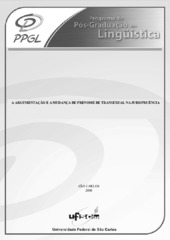A argumentação e a mudança de prenome de transexual na jurisprudência

Ver/
Fecha
2008-03-28Autor
Fernandes, Fátima Catarina
Metadatos
Mostrar el registro completo del ítemResumen
From the perspective of the Semântica do Acontecimento (Semantics of the Events) and the French Discourse Analysis, which the firs theoretical field dialogues with, we have studied the way the argument ( argumentação ) for changing a transsexual s first name is built through the speaker-petitioner s own words, as well as through the argument and the designations used by the speaker-judge in order to authorize the alteration of a transsexual s first name. In the legal process, proceeded in the enunciation space of São Carlos, state of São Paulo, the petitioner transsexual Agnaldo requests the modification of his masculine first name into the feminine name Ângela. For that study we have adopted the concepts of designação (designation) reescritura (re-writing), cena enunciativa (enunciation scene), politico (politician) and argumentação (argument). Through the analysis of the corpus we could understand how the process of conception of the transsexual s own identity takes place,
and how the process of social inclusion of the transsexual subject occurs (the politician being considered) for the subject, once socially excluded, is now included for the modification of the first name sentenced by the judge. There is always the liaison between the social and the politician (político), once the social recognition needs to be legally legitimated so that it can politically happen: the Constitution guarantees the political in the social perspective. Thus, in the political instance, the fragmentation takes place because the speaker-petitioner needs a place of belonging (recognition) and this place (recognizing himself as a subject being a woman ) is legitimated in the juridical discourse. Then, we understand how the process of social identification, connected with the scientific discourse, which has its own crystallized place, may contribute to the alteration of the transsexual s first name in the argumentation of the speaker-judge. Consequently, we can claim that the event and the litigation make the speaker-petitioner s speech move into the memorable (memorável) of the social environment, of the esthetical perspective and of the psychological constitution in order to change the name and that inserts him in the identity of a transsexual. And under the perspective of a liberal subject position, the speaker-judge sentenced favorably for the legitimating of the first name Ângela, who the speaker-petitioner has semantically a new body. This substitution of the official first name by the real one consolidated a new jurisprudence.